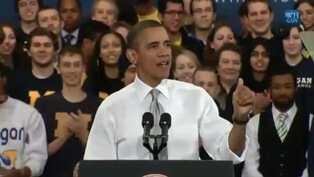 WASHINGTON (AP) -- One of the oldest U.S. civil rights groups says President Barack Obama may have a tougher time winning at least three battleground states in November if black voter turnout falls at least 5 percentage points below the record levels that helped to put him in the White House.
WASHINGTON (AP) -- One of the oldest U.S. civil rights groups says President Barack Obama may have a tougher time winning at least three battleground states in November if black voter turnout falls at least 5 percentage points below the record levels that helped to put him in the White House.
Black voter turnout of 64.7 percent was a significant factor in Obama's victory in 2008, and African Americans are considered solidly behind Obama now. But having achieved the milestone of electing the nation's first black president, black voters may be less motivated to return to the polls in droves again, the National Urban League said in a report to be released Tuesday.
The Urban League released its report ahead of the president's July 25 speech scheduled for opening day at its national convention in New Orleans, and a week after Romney was booed at the National Association for the Advancement of Colored People convention for saying, among other things, that he would repeal Obama's landmark health care law if he is elected.
Assuming no change in 2008 voting patterns, Urban League researchers said, black turnout at about 60 percent or below could cost Obama the state of North Carolina and make it difficult for him to win Ohio and Virginia. In addition to diminished voter enthusiasm, the still-ailing economy, persistent high unemployment among blacks, new state voting laws and limited growth in the African-American population could help discourage turnout.
``We achieved a high-water mark in America in 2008. For the first time, African Americans were at the table with white America'' because the turnout of black voters was just 1.4 points below white voters, said Chanelle Hardy, senior vice president and executive director of the National Urban League Policy Institute. But, ``because we achieved so much in 2008, we have to push even harder to meet those numbers.''
``President Obama does not take a single vote or support from any community for granted, and he is working to secure the same levels of support based on policies that give everyone a fair shot and the opportunity to succeed,'' said Clo Ewing of the Obama campaign.
The campaign for likely Republican nominee Mitt Romney said he would compete for black votes.
Tara Wall, a spokeswoman for Romney's campaign, said Romney acknowledges he won't get a majority of black voters' support but recognizes Obama can't count on the margins he once enjoyed.
``Every percentage point that we chip away from President Obama counts,'' Wall said.
A number of other changes could affect the influence of the black vote. Increased turnout of Hispanic voters, who went heavily for Obama in 2008, or drops in the turnout of conservative Republicans could conceivably offset a lower black-voter turnout.
Marc Morial, National Urban League president, said the African-American vote should not be thought of as static, even if black voters are expected to overwhelmingly cast their ballots for Obama. ``We wanted to point out that turnout makes a difference, and African-American turnout makes a difference,'' Morial said.
- Home
- News
- Opinion
- Entertainment
- Classified
- About Us
 MLK Breakfast
MLK Breakfast- Community
- Foundation
- Obituaries
- Donate
04-18-2024 5:09 pm • PDX and SEA Weather


















































































































































































































































































































